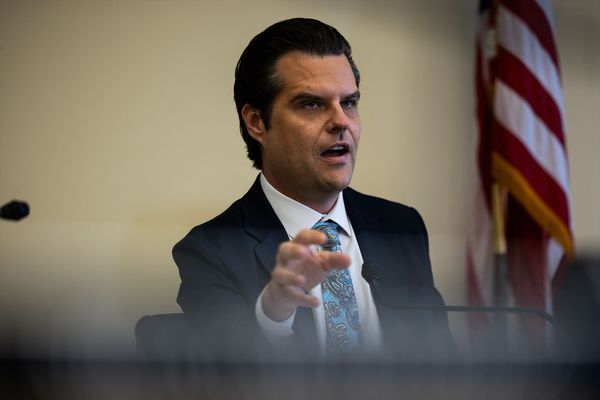
Disability rights activists operating under the title of the Sicko Liberation Organisation picketed outside the office of NDIS Minister Bill Shorten last Thursday.
“Ritalin has the mic right now,” said the organiser, leading a small huddle of aggrieved protesters who felt blindsided by Labor’s recent reforms to the National Disability Insurance Scheme (NDIS).
After nearly 100 amendments, the final law will change how NDIS participants receive plan budgets, with many services altered or removed. The NDIS head will also have more power to prevent top-up payments on a participant’s budget. People with Disability Australia president Marayke Jonkers has said the changes would limit access to necessary support.
The organiser of the protest outside Shorten’s office ran the crowd of 40 or so people through some prickly chants:
ALBO, WONG,
SHORTEN TOO
WHEN SICKOS RISE UP
WATCHA GONNA DO?THE MEEK WON’T INHERIT
WE’RE TAKING WHAT WE NEED
OVERTHROW LABOR
END AUSTERITY.
“We are disabled, dying and protesting in bed,” said an organiser. Another speaker relayed their experiences in group homes, the “unending trials and tribulations” of navigating the NDIS, and the overwhelming sense of betrayal and abandonment.
“Disabled activists and their allies have gathered at Shorten’s office today to protest the outcomes from the disability royal commission and the dire living circumstances of the disabled community in so-called Australia,” an organiser said.
The protesters’ demands were clear: Labor must accept and implement all recommendations of the disability royal commission, including amending the Fair Work and Disability Discrimination Acts, and provide intensive support for First Nations disabled people and disabled people experiencing houselessness, family violence and other forms of marginalisation.

Pre-recorded speeches played over the loudspeakers. One detailed the horrors of being lost in the system, of misdiagnosis and expense, homelessness and hardship, of a life spent slipping between cracks that were then themselves paved over.
“I want to die,” one person said. A nod of familiarity rippled through the crowd.
Soon after, news came through that Parliament had passed Labor’s NDIS bill. The organiser announced this to boos and jeers, stating, “This protest is now a public funeral for what little the NDIS gave us as of five minutes ago.”
A small group took the ironically wheelchair-unfriendly elevator to Shorten’s office’s door, where they sat reading their demands and ringing the doorbell.
It was a bleakly comical scene when 10 or so huge police officers spilled out of the tiny lift to loom menacingly over a frail person with a degenerative muscle disorder and a wheelchair-bound person waving a sign. The police handed out move-on orders and herded the little contingent back into the lift and outside the building.

Masked and anonymous, these “sickos” were just that: the disabled, the chronically ill, the undiagnosed and untreatable. They sat in wheelchairs, walked on crutches, and leaned on their canes. They fatigued quickly, and the energy they were expending just being there would come at a high cost.
“I’m going to have to spend the next two-to-three days in bed,” one laughed, “but that tells you just how pissed off I am.”
Back on the street, protesters made links between Labor’s ongoing support for Israel and the party’s disregard for the disabled community. “Genocide and disability injustice go hand in hand,” a speaker said.
“I just… can’t see a future for myself,” one protester said between chants. “I can’t go on doing this. I can’t fill out any more forms. I can’t keep having to prove that I’m sick, that I need help.”
“I am an educated, employed, healthy woman in her 30s who should be thriving,” said a woman in a pre-recorded speech. “Instead, I am spending most my days caring for my sick and dying mother, with little to no help or support from a government that promised to help me.”
“The money is laughable,” someone said. “My landlord just raised my rent for the second time in six months. I’m already skipping meals. I’m so hungry, so tired. I just don’t know what’s next.”
The protesters’ growing sense that they’d been left to fend for themselves had been what brought the Sicko Liberation Organisation about to begin with. This overlooked community had come together at real personal cost to have their voice heard by a minister who dictates not only the course of their lives but their very ability to live.
The continuity between this government and the last with regards to the disabled community is indifference. The general sense among those who participated in or simply paid attention to the royal commission was that their often painful testimonies were ultimately ignored.
They are now beyond demanding to be heard. What they want — what they desperately need — is radical reform of a system that can’t help but radicalise those who tangle with it. Groups like the Sicko Liberation Organisation are the inevitable result of exclusion and deprivation.
“Cripples are expensive,” an organiser told me. “They see us as a bad investment. At the end of the day, we just need more money,” they sighed as a nearby busker began playing “Pennies from Heaven”.
“We think we’re worth it, even if they don’t.”







